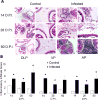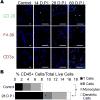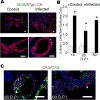The common parasite Toxoplasma gondii induces prostatic inflammation and microglandular hyperplasia in a mouse model
- PMID: 28497488
- PMCID: PMC6826344
- DOI: 10.1002/pros.23362
The common parasite Toxoplasma gondii induces prostatic inflammation and microglandular hyperplasia in a mouse model
Abstract
Background: Inflammation is the most prevalent and widespread histological finding in the human prostate, and associates with the development and progression of benign prostatic hyperplasia and prostate cancer. Several factors have been hypothesized to cause inflammation, yet the role each may play in the etiology of prostatic inflammation remains unclear. This study examined the possibility that the common protozoan parasite Toxoplasma gondii induces prostatic inflammation and reactive hyperplasia in a mouse model.
Methods: Male mice were infected systemically with T. gondii parasites and prostatic inflammation was scored based on severity and focality of infiltrating leukocytes and epithelial hyperplasia. We characterized inflammatory cells with flow cytometry and the resulting epithelial proliferation with bromodeoxyuridine (BrdU) incorporation.
Results: We found that T. gondii infects the mouse prostate within the first 14 days of infection and can establish parasite cysts that persist for at least 60 days. T. gondii infection induces a substantial and chronic inflammatory reaction in the mouse prostate characterized by monocytic and lymphocytic inflammatory infiltrate. T. gondii-induced inflammation results in reactive hyperplasia, involving basal and luminal epithelial proliferation, and the exhibition of proliferative inflammatory microglandular hyperplasia in inflamed mouse prostates.
Conclusions: This study identifies the common parasite T. gondii as a new trigger of prostatic inflammation, which we used to develop a novel mouse model of prostatic inflammation. This is the first report that T. gondii chronically encysts and induces chronic inflammation within the prostate of any species. Furthermore, T. gondii-induced prostatic inflammation persists and progresses without genetic manipulation in mice, offering a powerful new mouse model for the study of chronic prostatic inflammation and microglandular hyperplasia.
Keywords: Toxoplasma gondii; hyperplasia; inflammation; parasite; prostate.
© 2017 Wiley Periodicals, Inc.
Conflict of interest statement
None.
Figures






Similar articles
-
A human prostatic bacterial isolate alters the prostatic microenvironment and accelerates prostate cancer progression.J Pathol. 2015 Feb;235(3):478-89. doi: 10.1002/path.4472. J Pathol. 2015. PMID: 25348195 Free PMC article.
-
Acute bacterial inflammation of the mouse prostate.Prostate. 2012 Feb;72(3):307-17. doi: 10.1002/pros.21433. Epub 2011 Jun 16. Prostate. 2012. PMID: 21681776 Free PMC article.
-
Impact of Engineered Expression of Mitochondrial Association Factor 1b on Toxoplasma gondii Infection and the Host Response in a Mouse Model.mSphere. 2018 Oct 17;3(5):e00471-18. doi: 10.1128/mSphere.00471-18. mSphere. 2018. PMID: 30333181 Free PMC article.
-
Inflammatory response to Trichomonas vaginalis in the pathogenesis of prostatitis and benign prostatic hyperplasia.Parasites Hosts Dis. 2023 Feb;61(1):2-14. doi: 10.3347/PHD.22160. Epub 2023 Feb 22. Parasites Hosts Dis. 2023. PMID: 37170459 Free PMC article. Review.
-
The controversial relationship between benign prostatic hyperplasia and prostate cancer: the role of inflammation.Eur Urol. 2011 Jul;60(1):106-17. doi: 10.1016/j.eururo.2011.03.055. Epub 2011 Apr 9. Eur Urol. 2011. PMID: 21497433 Review.
Cited by
-
The Bradyzoite: A Key Developmental Stage for the Persistence and Pathogenesis of Toxoplasmosis.Pathogens. 2020 Mar 21;9(3):234. doi: 10.3390/pathogens9030234. Pathogens. 2020. PMID: 32245165 Free PMC article. Review.
-
Prostatic Escherichia coli infection drives CCR2-dependent recruitment of fibrocytes and collagen production.Dis Model Mech. 2025 Jan 1;18(1):DMM052012. doi: 10.1242/dmm.052012. Epub 2025 Jan 24. Dis Model Mech. 2025. PMID: 39748675 Free PMC article.
-
Factors Influencing Tissue Cyst Yield in a Murine Model of Chronic Toxoplasmosis.Infect Immun. 2023 Jul 18;91(7):e0056622. doi: 10.1128/iai.00566-22. Epub 2023 Jun 26. Infect Immun. 2023. PMID: 37358419 Free PMC article.
-
The Multifaceted Role of Osteopontin in Prostate Pathologies.Biomedicines. 2023 Oct 26;11(11):2895. doi: 10.3390/biomedicines11112895. Biomedicines. 2023. PMID: 38001899 Free PMC article. Review.
-
MicroRNA-155 deficiency attenuates inflammation and oxidative stress in experimental autoimmune prostatitis in a TLR4-dependent manner.Kaohsiung J Med Sci. 2020 Sep;36(9):712-720. doi: 10.1002/kjm2.12229. Epub 2020 May 21. Kaohsiung J Med Sci. 2020. PMID: 32436368 Free PMC article.
References
-
- Sakr WA, Grignon DJ, Crissman JD, et al. High grade prostatic intraepithelial neoplasia (HGPIN) and prostatic adenocarcinoma between the ages of 20–69: an autopsy study of 249 cases. In Vivo. 1999;8:439–443. - PubMed
-
- Jemal A, Thomas A, Murray T, Thun M. Cancer statistics, 2002. CA Cancer J Clin. 2002;52:23–47. - PubMed
-
- Nelson WG, De Marzo AM, Isaacs WB. Prostate cancer. N Engl J Med. 2003;349:366–381. - PubMed
-
- Xu J, Zheng SL, Komiya A, et al. Germline mutations and sequence variants of the macrophage scavenger receptor 1 gene are associated with prostate cancer risk. Nat Genet. 2002;32:321–325. - PubMed
MeSH terms
Grants and funding
LinkOut - more resources
Full Text Sources
Other Literature Sources
Medical

